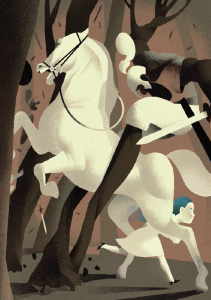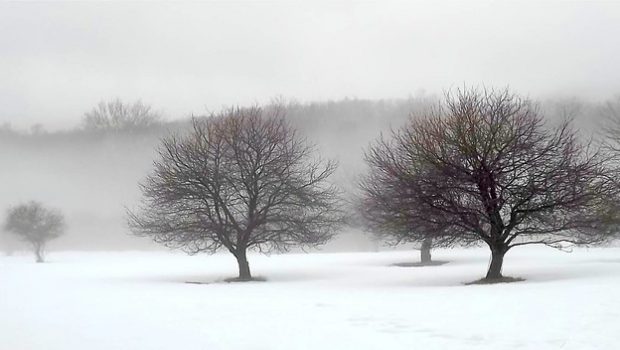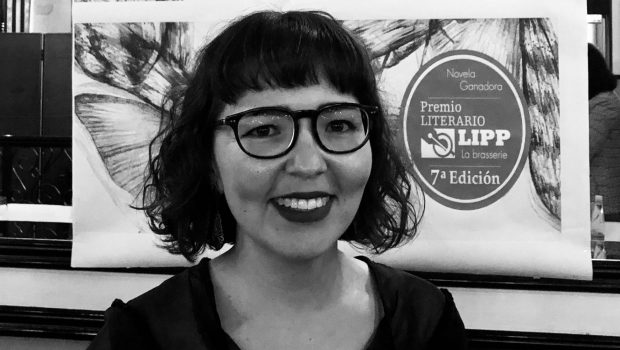The Lovely Maiden with Azure Hair
Adolfo Córdova
English translation by Tanya Huntington
In her wake, warriors become trees.
Above the soles of their shoes, their toes pierce the leather and stretch out, like thirsty roots, into the depths of the earth. Their arms stretch upwards and join the foliage of former hair. Their pale skins become brown and hard. A single trunk is formed by the legs. Their ribs branch out into the light. And their hearts of resin start to pump a cold, transparent blood.
The warriors regard one another, horrified; planted men, almost entirely trees.
Before the enchantment deafens them forever, some can still hear the cries of their comrades at arms. It is the girl, continuing her advance. In her wake, the wind whirls, hairs rise, dust crumbles. Men cannot understand, they know not from whom to defend themselves, where to continue. It is enough for her to brush past them. And then, nothing more.
A final groan is heard before a layer of bark spreads over their ears.
Trees.
The fairy, a lovely maiden with azure hair, smiles. Finally, armor and helmets have become worthy carcasses. They will provide shelter, nests, firewood, nourishment. These men will live longer than any war has ever lasted.
Dusk falls. Horses gallop free under the first shade ever cast by tender leaves. Swords rest among the fallen leaves. The sinister echoes of hundreds of cries are carried away by the wind.
Later, night thunders.
And a storm bathes the new forest.
But it wasn’t always that way.
***
The Lovely Maiden with Azure Hair opens her eyes for the first time stretched out in a meadow. She hears crying, then rises to see where it is coming from. It is not the grass that cries, but a newborn child. Already the dew is dry on his forehead, and his body looks bruised. She rocks him in her arms, and he stops crying. She looks for a mother, a father, a home. Nothing. There is no one around.
The girl is a fairy born out of the crying of the babe, and she will take care of him forever, making sure he does not stray too close to the abyss, making sure he does not slide into the river, making sure he eats no scarlet berries.
Suddenly, a rustling in the grass. The girl turns, afraid. She sees… but it is too late. The wolves announce their presence barely a heartbeat before throwing themselves on their prey. They devour both the boy and the fairy, who dies alongside the newborn child.
The thicket waves gently and in silence.
A thread of wind lifts the remains of the girl-fairy and reweaves her into the form of a she-wolf. Her fur is azure-colored and her eyes, white.
Before taking her first step, the fairy-wolf sniffs the blood of the babe, licks the reddened earth and causes a juniper to sprout there. Then she circles the sapling tree, lulls it with a howl and leaves.
As the juniper grows and grows, she enters the forest without disturbing anyone.
A silvery moon glows in the center of the night.
***
For a long time, the fairy roams as a she-wolf. She has no herd. She never sleeps.
She checks the hollows of trees, the stains in the grass, every extinguished hearth. Until one night, finally, she finds another babe, another abandoned son. He is dead. The she-wolf licks the little one’s skin and instantly, he takes root.
Too late, she hears the hunter. Then an arrow surprises her, piercing her turquois-blue hide.
A larch tree sprouts next to the she-wolf’s body.
A thread of wind lifts the she-wolf, unweaves her and weaves her again, this time with black-and-white feathers and an azure crown. A bird.
The fairy flies away, transformed into an imperial woodpecker.
And when the hunter, repentant, looks for the son he abandoned in the forest, he cannot find his body among the grass, nor any trace of the she-wolf he shot with an arrow.
In her place, he watches the larch tree grow, already blooming with rosy flowers. And he hears a toc-toc, the pecking of a beautiful bird with an azure crown.
***
For a long time, the fairy flies as an imperial woodpecker. She never sleeps. With her beak, she carves the faces of children into trunks. She looks down as she flies.
She searches.
One morning, before the break of day, she hears a groan. She flies quickly to find the source and discovers a redheaded girl, tossed onto a bed of dampened leaves. She is around six years old. They took her into the heart of the forest and left her there. Her parents walked for a long time. Perhaps she asked them to turn back and they told her, “just a little bit farther,” and once night had fallen, they saw that she too had fallen asleep. They may have even given her a kiss goodbye before they abandoned her.
The Fairy-bird knows that the girl will not last another night. She will die like the others, pursued by some beast or by the mist. So, she begs the spirits of the air to help her, to unweave and weave with their breezy fingers an enchantment that will save her. In exchange, she promises them she will find the girl’s parents and avenge her death.
The spirits accept. They suggest that she take the place of the girl, that the girl fly away using her bird wings.
Dawn breaks.
The beasts watch from their burrows, hidden among the bushes, crouching behind the rocks.
The mist fades away.
A woodpecker flies back to her tree. The plumage on her crown is red.
A girl advances with resolve. The wind weaves three braids into her azure-colored hair.
***
For several days, the Lovely Maiden with Azure Hair explores the forest. When she finally reaches her parents’ home, they pretend to be glad to see her.
“She has blue hair,” the mother thinks. “How did she survive?”, the father thinks. But neither spreads their arms wide to welcome her. Nor does the girl; she rushes towards them, moves between them and brushing past them, keeps on running.
Behind her, a final cry as the bodies stiffen. Two poplars rise up violently, breaking through the thatched roof.
Trees.
They will count their lives in centuries, in branches torn by lightning.
The girl-fairy has kept her promise, but she lingers for a while in the village. She watches the children from afar, keeping them safe from their parents. Until one day, she hears a neighing, a galloping, a military march. She hurries off to find an army stationed in the middle of the field.
The soldiers light their torches, preparing to invade the village. The girl-fairy advances. A shout orders them to march into battle. She continues to press forward. They ignore her: yet another orphan, so small, so insignificant.
As she passes by, the wind whirls, hairs are raised, dust crumbles. Men cannot understand. It is enough for her to walk between the armies to sow forests in barren lands.
And her crop is abundant.
Many times, she makes forays into the ranks on one side, then the other. Sometimes she laughs, to their horror.
Trees.
***
After a while, the spirits of the air reward the girl and weave her a little white house to show how pleased they are. There she lives for many centuries, far away from people, accompanied by animals who turn the white home into a warren, a cave, a hideout. No man would ever be able to warn another about this powerful fairy with azure hair. The numbers of the missing are legendary. Only the children who are lost in the fairy’s woods ever return to their homes. Those who enter with bows and arrows, with axes or rifles, are never seen again. She takes turns being an eagle, a she-wolf, a hare, a firefly; she has learned to transform, but just before touching them, she becomes a girl again. One brush from her is enough to make the forest denser. Then she rests. She lives for hundreds and hundreds of years in her little white home.
Until one night, a king has a dream.
***
In the middle of that immense forest that almost no one enters anymore, a king dreams that he is searching for his father, that other king who never came back from the war. He flounders about in the thicket until he discovers a white cottage, a girl coming outside. The king hides and observes another man who approaches the girl. He is lost, he asks her for help. She takes his hand and the man starts to groan, to branch out with twists and turns. From his hiding place, the king aims his shotgun. The girl turns to stare at him, her hair is azure-colored. The king awakens.

Hermosa niña de pelo turquesa ©Riki Blanco
All those missing armies that legends speak of… his own father… and the sinister cries that some swear they have heard on the outskirts of that forest… It is she. The fairy turns them into trees.
No matter how he thirsts to conquer neighboring kingdoms, he lacks the troops to do so. And so, the king imagines a wild alliance: the fairy-girl at the head of his armies. He imagines this often, and thinks all day long of how he might get close enough to win her over, capture her. Until one night, he dreams of the answer.
In the middle of that vast forest almost no one enters anymore, the king sees a lost child. This time, the girl speaks to him sweetly; she remains at a distance, she offers him a basket with honey and bread. The boy eats. She orders the birds to guide him safely back home. No spells are cast. The king awakens.
He sends for his younger son, Lorenzini, a lively and restless young man. He doesn’t hesitate to ask him to go off in search of the maiden with azure hair, tell her he is lost, ask for her aid, and gain her trust; then return several times, make her fall in love, and promise her the kingdom; whatever it takes. A powerful fairy like her would help him win a hundred wars, a hundred and then some.
***
An escort remains waiting at the edge of the forest. Prince Lorenzini walks for a long time before he finds the little white house. His heart races. He is not interested in his father’s war or the kingdom. He wants to meet the fairy, and he runs to her doorstep.
The Lovely Maiden with Azure Hair lies asleep on her bed. She hears someone knocking, as if in wild desperation. She descends the stairs expectantly, then opens the door.
Upon seeing her, Lorenzini smiles. He is barely a year or two older than she is. He marvels at her azure hair, her she-wolf gaze, her egret neck. And he laughs nervously.
It is no more than a chortle from the youth who stretches out his hand to greet her. She is unsure whether he is a boy or a man. He laughs like the former, but displays the valor of the latter.
And the fairy likes him. But she knows that her nature prevents her from ever touching him.
He insists on a formal greeting. He tries to take her hand. He feels an impulse to caress her hair. The fairy withdraws and turns herself into a tame sheep. Then she allows Lorenzini to pet her.
And this happens many times, because he returns every week. One might even say that the fairy grew from one afternoon to the next and is a young woman now. They gaze at each other from a distance. They come closer, but without touching, until she becomes a vixen or a tanager, and then he caresses her azure-colored fur or bluish feathers.
The prince enjoys sleeping in the depths of the forest, embracing her.
But the king becomes impatient. He asks Lorenzini what is taking so long.
He asks his father for more time.
“There is no more time left,” his father answers. “War is imminent.”
And Lorenzini, he too, feels he can no longer wait.
***
They are on a stroll through the forest. The fairy wants to show the prince the white eagle that has come to announce the snowfall. She looks for her. She peers among the branches. She thinks she hears a galloping sound in the distance and becomes distracted. Lorenzini embraces her and gives her a kiss.
She is unable to stop him. There is no time to transform into a blackbird, into a deer, into a lamb.
Or perhaps she does not want to.
And she weeps, this beautiful young woman, her lips pressed to the bark of a sapling tree.
***
Snow falls in the forest. A pine tree stands tall. Its lush branches filled with needles protect a fairy leaning against its trunk. She prays, begging the spirits of the air to release her.
She has already died so many times.
She longs to be buried at the foot of the pine tree that is Lorenzini, so that his roots may encircle her body and embrace her again, become entangled in her azure-colored hair.
The spirits whistle their reply. No. Not yet.
The fairy is infuriated by her own immortality.
One day, soon afterwards, she hears a neighing and galloping nearby. It is the king, Lorenzini’s father, who leads a search party and has arrived at the doorstep of the little white cottage.
The fairy transforms into a woodpecker and flies off to take refuge on one of the branches of the pine tree. From there, she can see how the king and his soldiers try to burn down her home, but the wind prevents them from doing so. They shoot all the animals inside, the ones that live with the Fairy. They cut down the trees, and then they leave…
And the king dies in one of his hundred-or-so wars.
***
The fairy leaves her home only to visit Lorenzini, the pine tree that sometimes allows the echo of a chortle to escape.
She neglects the forest.
In her wake, whirlwinds no longer rise, no one feels endangered. Men begin to delve once again into her woods. They return. They forget the terrible tales.
She lets them cut down as many trees as they wish and then some, except for hers. And it so happens that one day, while the fairy is asleep, the spirits of the air, enraged, uproot the pine tree with their fingers made of wind. They toss him onto a nearby village.
The fairy does not know this, but from her tree the villagers take firewood. They also fashion chairs, tables, toys, marionettes…
Once she discovers what the spirits have done, she does not complain. She knows it is only fair. She had, after all, renounced her nature as a fairy. She no longer possessed the will.
And she locks herself up once again in her home.
She desires to sleep until she is dead.
***
And so, for a long time, the Lovely Maiden with Azure Hair sleeps with her arms crossed on her breast. She awaits the mercy of the wind. She begs for a coffin. She dreams of the depths of the earth, her heart starting to pump a cold, transparent blood. She recalls the cry of the first newborn, her she-wolf body, the faces of children carved into the trunks of trees… when she needed only to walk among armies in order to sow forests in barren lands.
She dreams and dreams of centuries ago, of the day she awoke among the underbrush.
And she awakes.
She hears a voice that makes her start. Someone pounds on the door of her house, as if in wild desperation.
Lorenzini! It sounds like Lorenzini’s voice.
“Who is it?” the fairy whispers. She peers out of the window. It is not him. It is a marionette made of pine wood. A lively, mischievous marionette who asks her for help, like a lost child. Like a son with no parents.
As if he knew her.
~~~
“No one lives in this house. Everyone is dead.”
“Won’t you, at least, open the door for me?” cried Pinocchio in a beseeching voice.
“I also am dead.”
“Dead? what are you doing at the window, then?”
“I am waiting for the coffin to take me away.”
After these words, the little girl disappeared and the window closed without a sound.
“Oh, Lovely Maiden with Azure Hair,” cried Pinocchio, “open, I beg of you…”
CARLO COLLODI, The Adventures of Pinocchio, 1883
 Adolfo Córdova (Veracruz, Ver., 1983) A journalist, writer and researcher, Córdova holds a Master’s degree in Books and Literature for Children and Young Adults from the Autonomous University of Barcelona. His awards include the Premio Nacional Bellas Artes de Cuento Infantil Juan de la Cabada (2015), Los mejores del Banco del Libro de Venezuela (2017) and The White Ravens (2017) for his book El dragón blanco y otros personajes olvidados, to which this story belongs. He has received grants from the United Nations, the Fondo Nacional para la Cultura y las Artes, the International Youth Library in Munich, the CEPLI in Cuenca, Spain and the Cornelia Funke Foundation in California. His most recent books are Jomshuk. Niño y dios maíz and Renovar el asombro. Un panorama de la poesía infantil y juvenil contemporánea en español. Visit his blog specializing in literature for children and young adults: linternasybosques.com.
Adolfo Córdova (Veracruz, Ver., 1983) A journalist, writer and researcher, Córdova holds a Master’s degree in Books and Literature for Children and Young Adults from the Autonomous University of Barcelona. His awards include the Premio Nacional Bellas Artes de Cuento Infantil Juan de la Cabada (2015), Los mejores del Banco del Libro de Venezuela (2017) and The White Ravens (2017) for his book El dragón blanco y otros personajes olvidados, to which this story belongs. He has received grants from the United Nations, the Fondo Nacional para la Cultura y las Artes, the International Youth Library in Munich, the CEPLI in Cuenca, Spain and the Cornelia Funke Foundation in California. His most recent books are Jomshuk. Niño y dios maíz and Renovar el asombro. Un panorama de la poesía infantil y juvenil contemporánea en español. Visit his blog specializing in literature for children and young adults: linternasybosques.com.Posted: September 12, 2019 at 10:10 pm










